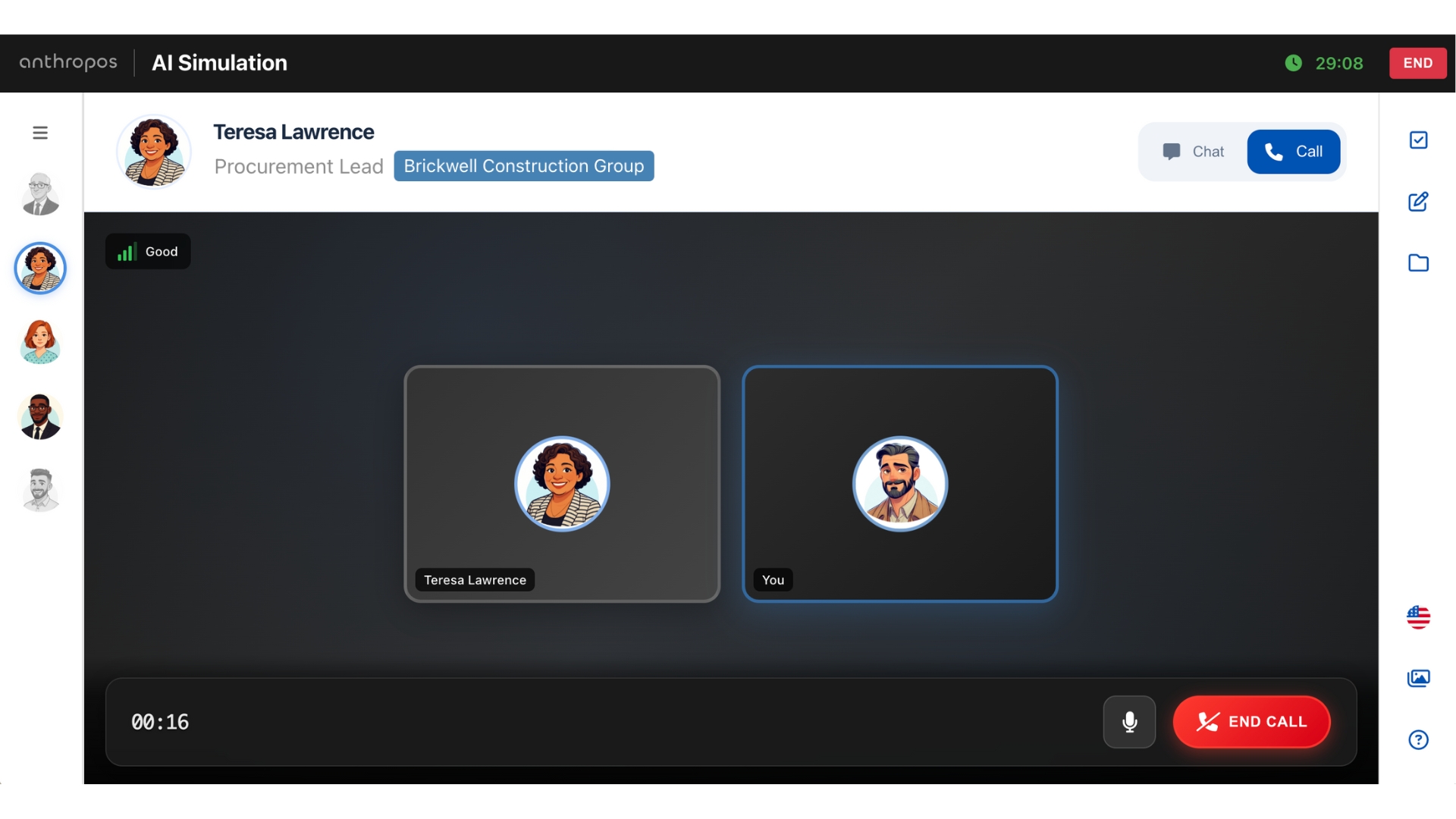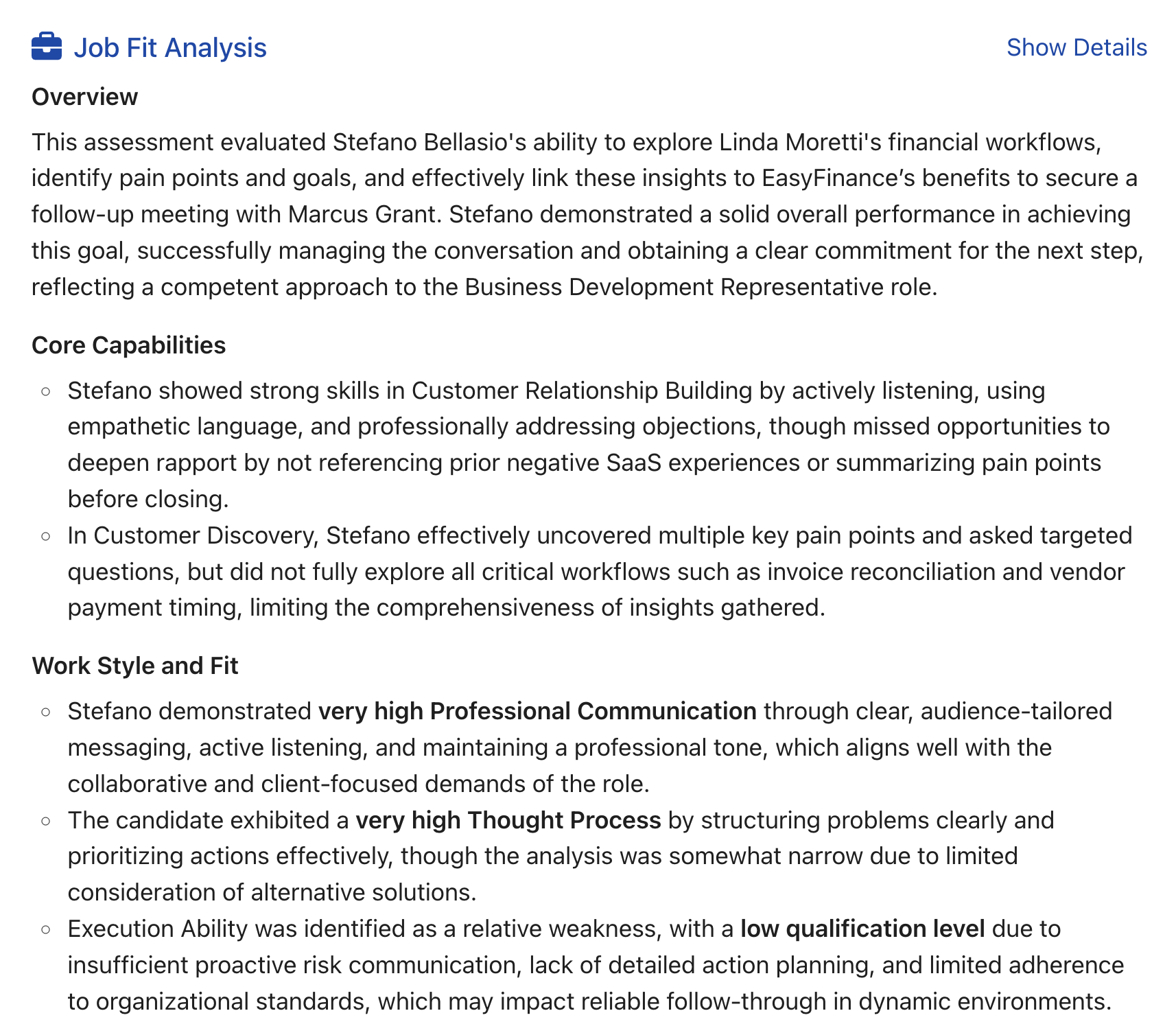Hiring the right sales rep can accelerate your revenue. Hiring the wrong one can set you back an entire quarter.
Sales is a uniquely high-stakes role. Unlike many functions, its impact is direct, immediate, and measurable. A good rep closes deals, strengthens pipeline, builds trust with prospects, and represents your brand in motion. A poor one does the opposite—slows growth, burns leads, and drains time from managers and teams.
What makes this even more complicated is how difficult it is to evaluate sales talent during the hiring process. A CV can only tell you so much. Interviews are often performative. And in most cases, you’re left making a decision based on how someone presents themselves, not how they actually sell.
This is the reality talent acquisition teams face every day: a high volume of sales applications, often filled with polished resumes, prepared interview responses, and very little real-world signal. And in today’s job market, with AI-generated resumes and templated success stories, distinguishing genuine talent from presentation has never been harder.
So how do you reduce the risk? How do you know whether a candidate can actually connect with your customers, understand your product, and move a conversation toward a close?
The answer: stop relying on guesswork and start watching the work—before it happens on the job.
The Case for Simulations in Sales Reps Hiring
At Anthropos, we believe that the most accurate way to assess a salesperson is to let them sell. Not in theory. Not hypothetically. But in a controlled, simulated environment that mirrors the real challenges they’ll face in your organization.
Our AI-powered simulations allow companies to create realistic sales scenarios that go far beyond traditional role plays or abstract assessments. Candidates aren’t just answering behavioral questions. They’re stepping into actual customer conversations, simulated cold calls, objection handling, discovery sequences, and follow-up messaging.
These simulations are crafted to reveal how a candidate thinks, how they build rapport, how they deal with hesitation or pushback, and how well they understand your product, positioning, and industry context. That means you’re not just evaluating personality—you’re watching performance.
Let’s take a common scenario: screening 50 applicants for a sales development role. Traditional hiring might involve phone screenings, resume scans, and first-round interviews that take hours of time and produce little usable data. With Anthropos, you can invite all 50 candidates to complete a sales simulation that replicates a day-one scenario. It could involve reviewing a brief on your ICP, preparing a call strategy, and executing a simulated outreach or video pitch.
Within hours, your team receives structured, comparative data showing how each candidate approached the task. Who built credibility with the prospect? Who asked smart follow-up questions? Who demonstrated adaptability when the conversation shifted? Who actually understands your space and speaks your customers’ language?
That kind of insight simply doesn’t show up in a CV or a general interview. But it makes all the difference when you’re choosing someone to represent your product in front of real customers.

What Simulations Reveal That Resumes Can’t
Sales reps know how to tell stories—especially in interviews. They’re confident. They know what hiring managers want to hear. But that doesn’t mean they’re ready to navigate a complex sales process, understand buyer psychology, or tailor messaging to different industries.
Simulations cut through the noise.
In an Anthropos sales simulation, you might watch a candidate:
- Deliver a live product pitch to a simulated prospect
- Navigate a challenging objection about pricing or competitors
- Analyze a short sales brief and write a tailored follow-up email
- Choose which leads to prioritize in a time-constrained environment
- Interact with a simulated ICP in your specific industry, testing their ability to mirror tone, understand key pains, and position value
This kind of assessment captures both hard and soft skills: strategic thinking, empathy, product comprehension, messaging precision, objection handling, and even emotional intelligence. These are the traits that often separate top performers from average ones—but they’re nearly impossible to spot through resumes and interviews alone.

How Simulations Save Time and Reduce Cost in Hiring Sales Reps
Bad hires are expensive. For sales roles, that cost compounds over time. Onboarding takes weeks. Ramp-up takes months. And if you only discover that someone isn’t the right fit after a quarter or two, you’ve already lost pipeline, delayed deals, and burned management hours trying to course-correct.
With Anthropos, hiring teams reduce those risks by identifying the right candidates sooner. Instead of running multiple rounds of interviews to gather gut feeling impressions, simulations produce real data after a single session.
This not only speeds up the hiring process—it increases alignment between talent acquisition and sales leadership. Sales managers can review actual candidate behavior instead of being handed filtered notes. TA teams can shortlist with confidence. Candidates move through the process faster and with greater clarity.
Customers using Anthropos report a reduction in failed sales hires of up to 60%, shorter onboarding cycles, and stronger close rates from reps who were validated through simulation before joining. Even better: they save time screening large volumes of applicants while improving the quality of final-stage interviews.
A Better Candidate Experience, Too
Simulations don’t just benefit the hiring team. They improve the process for candidates as well.
Sales professionals are increasingly skeptical of hiring processes that feel generic or subjective. When a candidate is assessed through an Anthropos simulation, they get the chance to show what they can actually do. They gain insight into the job itself. They receive feedback. And even if they’re not selected, they walk away with access to a library of additional simulations to improve their skills—for free.
That makes your company stand out. Even those who aren’t hired leave the process feeling respected, evaluated fairly, and more prepared for their next opportunity. It’s a smart way to protect your brand, attract top talent, and build trust from the first touchpoint.

Start Sales Reps Hiring with Confidence
The risks of traditional sales hiring aren’t going away. But with the right tools, you can reduce them dramatically.
Simulations let you see salespeople in action before they join. You get real, observable performance. You save time. You avoid costly mis-hires. And you create a better, more modern experience for candidates and your internal teams.
If you’re ready to stop guessing and start hiring sales reps who actually sell, we’d love to show you how Anthropos can help.
It may also interest you
A blog to rethink work and career
This blog wants to help you understanding how to improve your career, acquire new skills, move to new industries and in general, how to deal with your job and think about it in your career context.
You can also find all the updates and news features of Anthropos.
If you feel this is helpful, sign-up for our newsletter, Square One.